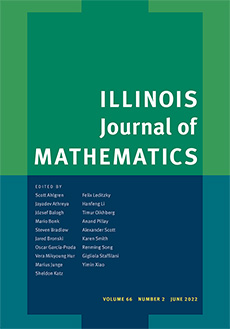Abstract
A permutation group is a three-star group if it induces a non-trivial group on each $3$-element subset of points. Our main results are that a primitive three-star group is generously transitive and that a finite primitive three-star group has rank at most $3$, that is, a stabiliser has at most $3$ orbits. We also describe the structure of an arbitrary (non-primitive) three-star group and give a collection of examples. In particular, we sketch a construction of infinite primitive three-star groups of arbitrarily high rank.
Citation
Peter M. Neumann. Cheryl E. Praeger. "Three-star permutation groups." Illinois J. Math. 47 (1-2) 445 - 452, Spring/Summer 2003. https://doi.org/10.1215/ijm/1258488164
Information





